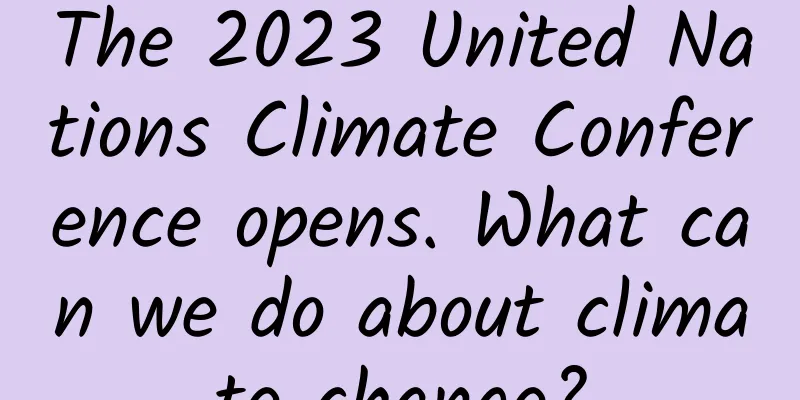The 2023 United Nations Climate Conference opens. What can we do about climate change?

|
On November 15, the Ministry of Ecology and Environment announced the Sunnylands Statement on strengthening cooperation between China and the United States to address the climate crisis. However, this statement was released just as the 2023 United Nations Climate Change Conference (COP27) was about to begin. Climate change, a mainstream topic in international popular science, is not a particularly hot topic in China's popular science circle. However, the popular science community and popular science research can actually make great contributions to raising public climate awareness and mobilizing the public to actively participate in climate-friendly actions. Image source: Pixabay Exploring climate knowledge and causes The first thing that the science and technology community can do for climate change communication is to systematically examine how the public views climate change and what exactly causes their attitudes . This work should not only review the extensive international climate communication literature, but also examine the research of domestic scholars on the characteristics of the Chinese public's climate cognition, and conduct targeted surveys based on the characteristics of the Chinese people. Looking at existing international research, it can be said that the complexity and uncertainty of scientific content is difficult to adapt to, and is the most direct cause affecting the public's acceptance of human-induced climate change. Over the past decade or so, as climate change has become increasingly politicized, conservative forces in the West have become increasingly inclined to oppose the scientific conclusions about climate change or question whether it is caused by human activities, resulting in the public's political attitudes increasingly determining their attitudes toward the climate. In China, the higher the measure of public patriotism, the more likely they are to recognize the occurrence of anthropogenic climate change and to support the adoption of proactive measures to deal with it . These studies are very preliminary, but clearly, compared to those that point to a high level of public recognition of climate change in China, they suggest that there is still much room for research on climate communication in China. Our research also found that the Chinese public's personal climate risk perception and personal benefit perception of climate change response cannot predict their climate attitudes, but their national climate risk perception and national benefit perception of climate change response are closely related to their climate attitudes. However, their national climate risk perception and national benefit perception cannot predict their own environmentally friendly behavior. The most powerful indicator for predicting their environmental behavior is their personal benefit perception. On the one hand, these studies can help us design climate persuasion strategies for the Chinese public . On the other hand, more importantly, they show us that most of the Chinese public still think that climate change has nothing to do with them and that addressing climate change is a matter for the country . This means that it is difficult to truly mobilize the public's awareness and motivation to address climate change by relying on various environmental protection organizations, including official environmental protection agencies, because the education targets of various environmental protection organizations are often people who already have a certain degree of environmental awareness and are willing to devote themselves to environmental causes. This is a big gap from the national science popularization system that targets the general public and can mobilize millions of science popularization workers across the country. Helping communicators spread the word about climate In fact, the lack of attention paid to climate change by the popular science community and most popular science writers is also related to the low popularity of climate change issues among the public. Many popular science or mass media reflect that climate change issues are a traffic killer, with visits not only lower than hot news, but also lower than other popular science articles. On the one hand, the media either describes climate change as a distant extraterritorial affair, or advocates for China’s position in international negotiations, or completely separates it from the country’s low-carbon development agenda (climate change is never mentioned in low-carbon reports). On the other hand, when faced with various abnormal weather conditions that are becoming more frequent under the background of climate change, the media forgets to mention climate change. Over time, readers will indeed feel that climate issues have nothing to do with them. Of course, the classic problem with media reporting on scientific issues—the difficulty of finding the right scientists to consult—also plagues climate reporting and climate science reporting. **In these aspects, the science popularization system can also play an important role. **The China Association for Science and Technology and local science and technology associations manage a system of scientific societies throughout the scientific community. Such a system can be a bridge between the media or science popularization reports and the scientific community. The China Science Writers Association and the China Science and Technology Journalism Association, both affiliated to the China Association for Science and Technology, can play an important role in the capacity building of the media and science popularization writers, such as training journalists and science popularization writers on how to report uncertainty, how to create drama while maintaining the scientific nature of the content of the report, and how to empower readers in the report. Although many of the above problems also exist in general science reporting, the popular science community (including the science and technology news community) has been trying to overcome them. It is entirely possible to integrate the improvement of science reporting capabilities with the improvement of climate change reporting capabilities. Debunking climate conspiracy theories Another thing that the science and industry can do to promote climate change is to refute various climate skepticism and conspiracy theories. Not only should they take the lead in refuting them themselves, but they can also provide more people with materials and platforms to refute these skepticism and conspiracy theories. Our team has also been analyzing climate skepticism and climate conspiracy theories in the domestic public opinion environment. Our basic conclusion is that climate skepticism and climate conspiracy theories are indeed rare in China's public opinion field, but many people have heard of them to some extent. There are two main types of typical climate skepticism/conspiracy theories. Previously, there has always been a conspiracy theory of Western evil, that climate change is a conspiracy developed by the West to suppress developing countries or specifically suppress China, but this rhetoric has sharply decreased after China made its dual carbon commitment. Another type of skepticism has begun to increase, that is, it is believed that climate change will lead to increased precipitation in the northwest and turn deserts into fertile fields, so there is no need to deal with climate change. The absurdity of the former statement is now self-evident, while the latter statement has been refuted by the climate science community . Climate scientists pointed out that data shows that rainfall in the Northwest region has not increased overall, and the increase in water volume in some individual rivers is actually related to the accelerated melting of glaciers in the Northwest region. This is not only not a benefit, but on the contrary will pose a threat to the long-term survival of the Chinese nation. Glaciers are melting. Image source: Pixabay So how do we really crack these conspiracy theories/skepticism? In our opinion, first of all, compared with climate skepticism, China's more serious problem in dealing with climate change is the low public awareness of it . Compared with refuting conspiracy theories, it is more important to link the dissemination of various extreme weather events to the background of climate change, so that the public can experience the threats and risks of climate change firsthand. Since climate skepticism is mainly spread among people through the public and social media, the most effective way to overcome the interpersonal dissemination of false information is to reduce the nodes of this dissemination. Only by making more people aware of the threat of climate change, the human activities that cause climate change, and the urgency of responding to climate change can more people stop being this dissemination node. Second, any belief that conspiracy theories/skepticism can have beneficial consequences that warrants support or at least waiver must be abandoned . For example, now a saying has become popular: "China has such a large new energy production capacity. If there is no climate change, how can we digest it?" But this utilitarian thinking that does not ask about scientific right and wrong and only talks about effects and benefits must be abandoned. People who come to so-called favorable conspiracy theory conclusions today may make statements that bring great harm tomorrow. Third, it is the construction of the climate communication system mentioned above. Climate scientists need to work more closely with journalists, popular science writers and other communicators to build confidence in science for them, so that they can find scientific authorities to answer their questions in a timely manner when they are confused, and ensure that any climate skepticism will not gain legitimacy by entering the media or authoritative sources. Finally, cracking climate conspiracy theories certainly depends on correct knowledge, but pure knowledge can only directly affect false statements that have already caused harm, and the acquisition of pure knowledge is also subject to the limited attention of the public. A more important and more fundamental solution is to strengthen analytical ability and scientific spirit in our popular science system . Studies have shown that the stronger the analytical ability, the less likely the public will believe in various types of conspiracy theories. Recently, there was an interesting long-term study that found that people who were more interested in science during the primary and secondary school science education stage would have a higher attitude of recognizing climate change when they grow up. Establish a collaborative science popularization system with climate as the link Most of the popular science analyzed above is helpful to improve public climate awareness and promote the public to adopt the conclusions of climate action. In fact, it is also effective for the routine work of popular science. In fact, given that climate change has formed a broad mobilization system, investing heavily in climate science popularization will also be of great benefit to the construction of my country's science popularization system itself. The opinions of the General Office of the CPC Central Committee and the General Office of the State Council in 2021 require the establishment of a science popularization coordination system throughout society, and climate science popularization can become a starting point for building such a system. By carrying out climate science popularization, the mainstream science popularization team can also accommodate more grassroots organizations to jointly work on improving citizens' scientific literacy and cultivating public environmentally friendly behaviors. Various grassroots organizations can also have more platforms to play their roles, such as hundreds of science and technology museums and thousands of various science popularization venues across the country. Many official science and technology museums often lament the lack of strength and exhibits, but a large number of environmental volunteers and public welfare organizations can actually fill this gap. Of course, to achieve this, we need to overcome many institutional obstacles and it is impossible to achieve it overnight. But just as it is impossible to build a national science popularization system and enhance the national science popularization capacity overnight, we also deserve to devote ourselves to the great mission of climate communication with greater patience, wisdom and innovation. References [1]Pan, Y., Xie, Y., & Jia, H. (2022). Lower carbon, stronger nation: Exploring sociopolitical determinants for Chinese public's climate attitudes. International Journal of Environmental Research and Public Health, 19(24), 2124604. https://doi.org/10.3390/ijerph19192124604 [2]Swami, V., Voracek, M., Stieger, S., Tran, US, & Furnham, A. (2014). Analytic thinking reduces belief in conspiracy theories. Cognition, 133(3), 572-585. [3]Motta, M. (2018). The enduring effect of scientific interest on trust in climate scientists in the United States. Nature Climate Change, 8(6), 485-+. https://doi.org/10.1038/s41558-018-0126-9 Planning and production Author: Jia Hepeng and Pan Yeheng, School of Media and Communication, Soochow University Editor: Xu Laiyinuo |
<<: Why do I feel sleepy after drinking coffee?
>>: Could it be possible that the original sculptor of the Sphinx was not a human?
Recommend
Real scene or AI-generated? The sharp eyes of identifying "Virtual Video" are here! The accuracy rate is as high as 93.7%
Today, AI video generation tools are changing ind...
How to create a breadcrumb navigation? How to modify the Robin breadcrumb navigation?
Each theme template has its own differences. The ...
7 practical skills for attracting private traffic to Xiaohongshu
Now that the traffic dividend has disappeared and...
World population reaches 8 billion!
The United Nations World Population Prospects 202...
Is an egg a day good or bad? How many eggs a week is the healthiest?
In our daily diet, eggs are undoubtedly a common ...
Nanjing Hearthstone CEO Zhu Wei: Mobile game development can also be "unconventional"
In early 2015, Newzoo, a game industry research o...
What does Shanghai’s full-area static management mean in 2022? When will it be lifted? Attached is the latest official notice
Recently, the local epidemic situation in Shanghai...
ALS is an incurable disease. How could Hawking live for more than 50 years despite suffering from this disease?
The scientific name of ALS is "amyotrophic l...
The dilemma of Youku, the follower
I don’t know when it started, but Youku Video’s i...
Liu Heng: 4 Lectures on Huangji Fengshui Internal Course
Liu Heng: Huangji Fengshui internal course 4 lect...
At the end of the year, beware of "fires burning the entire business"... How can small shops pay attention to fire safety?
recently Dalongqinghe Market in Panyu District, G...
Apple Watch Platform Cognition and Product Design
Today, Apple Watch has entered our field of visio...
The global EV battery market is expected to reach $67 billion in 2025
According to foreign media reports, a market rese...
Is there a "self-help manual for the second wave of the new crown" circulating online? Experts: It is very unreliable!
"When the child's temperature exceeds 38...
A preliminary study of Swift language learning - Mixing Object-C and Swift
After the Swift language comes out, new projects ...









